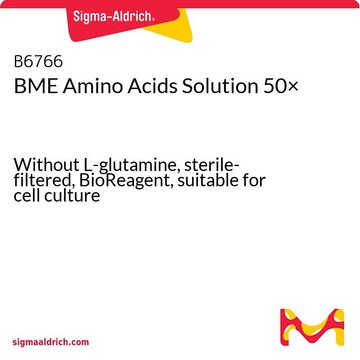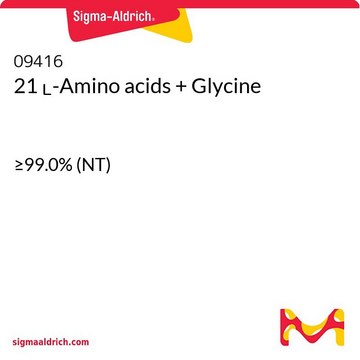R7131
RPMI 1640 Amino Acids Solution (50×)
Without L-glutamine, sterile-filtered, BioReagent, suitable for cell culture
Sinonimo/i:
Amino Acid Supplement
Autenticatiper visualizzare i prezzi riservati alla tua organizzazione & contrattuali
About This Item
Codice UNSPSC:
12352209
NACRES:
NA.75
Prodotti consigliati
Livello qualitativo
Sterilità
sterile-filtered
Nome Commerciale
BioReagent
Stato
liquid
tecniche
cell culture | mammalian: suitable
Impurezze
endotoxin, tested
Condizioni di spedizione
ambient
Temperatura di conservazione
2-8°C
Descrizione generale
RPMI 1640 Amino Acids Solution (50×) serves as an amino acid concentrate to supplement Roswell Park Memorial Institute medium (RPMI)-based mammalian cell culture media.
Applicazioni
RPMI 1640 Amino Acids Solution (50×) has been used as a supplement:
- in M9 minimal medium to culture the bacterial strains, SX701 and JE116
- to culture blood neutrophils from lactation cows in vitro
- for amino acid stimulation in amino-acid-free Roswell Park Memorial Institute medium (RPMI) medium to grow HeLa cells
Non trovi il prodotto giusto?
Prova il nostro Motore di ricerca dei prodotti.
Supplemento
N° Catalogo
Descrizione
Determinazione del prezzo
Codice della classe di stoccaggio
10 - Combustible liquids
Classe di pericolosità dell'acqua (WGK)
WGK 1
Punto d’infiammabilità (°F)
Not applicable
Punto d’infiammabilità (°C)
Not applicable
Scegli una delle versioni più recenti:
Possiedi già questo prodotto?
I documenti relativi ai prodotti acquistati recentemente sono disponibili nell’Archivio dei documenti.
I clienti hanno visto anche
Nuno Carinhas et al.
BMC systems biology, 5, 34-34 (2011-03-01)
Stoichiometric models constitute the basic framework for fluxome quantification in the realm of metabolic engineering. A recurrent bottleneck, however, is the establishment of consistent stoichiometric models for the synthesis of recombinant proteins or viruses. Although optimization algorithms for in silico
D Kazyken et al.
The Journal of biological chemistry, 297(4), 101100-101100 (2021-08-22)
The mechanistic target of rapamycin (mTOR) complex 2 (mTORC2) signaling controls cell metabolism, promotes cell survival, and contributes to tumorigenesis, yet its upstream regulation remains poorly defined. Although considerable evidence supports the prevailing view that amino acids activate mTOR complex
Preeti Ashok et al.
Frontiers in bioengineering and biotechnology, 8, 571425-571425 (2020-11-17)
Functional heart cells and tissues sourced from human pluripotent stem cells (hPSCs) have great potential for substantially advancing treatments of cardiovascular maladies. Realization of this potential will require the development of cost-effective and tunable bioprocesses for manufacturing hPSC-based cell therapeutics.
Piero Dalle Pezze et al.
Nature communications, 7, 13254-13254 (2016-11-22)
Amino acids (aa) are not only building blocks for proteins, but also signalling molecules, with the mammalian target of rapamycin complex 1 (mTORC1) acting as a key mediator. However, little is known about whether aa, independently of mTORC1, activate other
Daniel Bloch Hansen et al.
The Journal of membrane biology, 245(2), 77-87 (2012-03-03)
The present work was initiated to investigate regulation of the taurine transporter TauT by reactive oxygen species (ROS) and the tonicity-responsive enhancer binding protein (TonEBP) in NIH3T3 mouse fibroblasts during acute and long-term (4 h) exposure to low-sodium/hypo-osmotic stress. Taurine
Il team dei nostri ricercatori vanta grande esperienza in tutte le aree della ricerca quali Life Science, scienza dei materiali, sintesi chimica, cromatografia, discipline analitiche, ecc..
Contatta l'Assistenza Tecnica.










